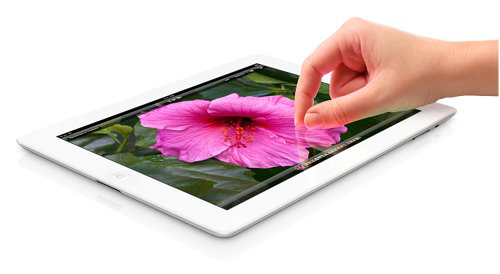Now is when the tablet comes of age for business
Now is when the tablet comes of age for business
 Last week’s launch of the new iPad was met with the excitable coverage that inevitably accompanies any Apple product announcement. But beneath the hype, does the new iPad herald wider business adoption of tablet computers?
Last week’s launch of the new iPad was met with the excitable coverage that inevitably accompanies any Apple product announcement. But beneath the hype, does the new iPad herald wider business adoption of tablet computers?
In November 2011, a study of IT adoption trends among UK small and medium businesses (SMEs) found 37% were using tablet computers. Another 37% said they were planning to purchase them.
So there’s a definite enthusiasm for and move towards tablet computers like the new iPad. And perhaps the emergence of cheaper competitors will accelerate this trend.
Why choose a tablet for business?
The real beauty of tablet computers is their portability. Their smart design, integrating everything into one neat, light panel, makes them ideal for use on the move.
They’re particularly useful for visual tasks, like running presentations or referring to spreadsheets, websites or designs when visiting a client. Many tablets let you take notes using a stylus or digital pen. Some will even convert your handwriting into type.
Tablets vs. laptops
Tablet computers tend to cost the same as, or a bit less than laptop computers. But can you really replace a laptop with a tablet? And would you want to?
Tablet are fun to use, at least initially. If you’re not used to using a fast, intuitive touch screen then your first days with a tablet can be really enjoyable.
However, when it comes to processing power, laptops have the edge. The latest iPad has heaps of power by tablet standards, but it won’t hold a candle to many laptops. Still, for everyday tasks that may not matter. You won’t notice a great deal of different when browsing the internet or using email.
The ergonomic issue
If you’re considering buying a tablet, think carefully about how you plan to use it. Typing on a touch screen can be awkward and may even be harmful. At least one study has found tablet users have a higher potential for neck and shoulder discomfort.
“It’s best to avoid typing for any length of time directly on a tablet computer,” warns back pain therapist Diksha Chakravarti. “It’s better to use a peripheral keyboard and stand, and remember to take regular breaks to stretch.”
Boosting battery life
A real bonus for tablet users is that the battery life of these slate-type devices tends to be much better than that of laptops. Your typical tablet computer’s battery will last more than twice as long as your average laptop’s.
This is partly due to the lower power demands of the solid state storage tablets rely upon. They also have other components specifically designed to minimise power use.
One of the trade-offs for this efficiency is in storage space. Tablets are able to hold much less data than your average laptop. Using cloud-based storage can make up the shortfall.
Indeed, tablets and cloud computing are natural partners. Touch screens lend themselves well to navigating web-based applications and you can get a whole host of business tools designed specifically for tablets.
What’s more, because these tools are hosted online (in the cloud), they put less strain on your tablet’s own storage capacity and processing power and are generally more secure, because the data isn’t stored on your easily-stolen tablet.
Should you invest in a tablet for business?
If you currently rely on a laptop as your main computer, replacing it with a tablet is probably not a good idea. Although tablets are super-portable and enjoyable to use, you’ll miss your laptop’s power, storage capacity and keyboard.
However, as a mobile device to complement your main desktop or laptop computer, a tablet can be ideal. Used in combination with the right cloud-based applications, it can seriously increase your productivity.
- Are tablet computers right for business?
- Sure, your iPad is cool. But my netbook is better for business
- iPads: they breed like, er, iPads
This is a guest post from Integral IT, a Yorkshire IT support company.




Comments
Add a comment